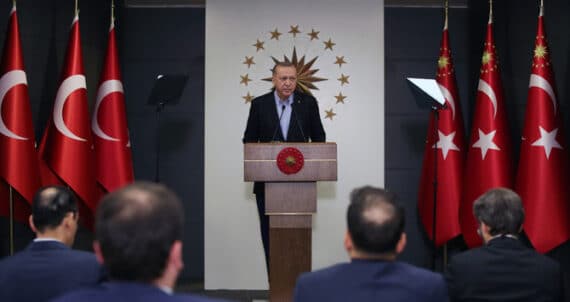Turkish intervention in Libya follows the new Turkish design as evidenced by Turkey’s increasing activity in Africa. This new doctrine of foreign policy in which Turkey is conceived as a world “producer of orders”. History, nationalism, religion and the economy are the factors behind the ties that unite the representatives of the Turkish government and the NGOs in the search for the old space of influence of the Ottoman State in the selected African countries for the new strategy.
Can Turkish intervention in Libya change geopolitics in the Mediterranean?
Libya has been embroiled in conflict since the ousting of dictator Moammar Gadhafi in 2011. For the past year, forces loyal to Libya’s eastern military strongman Khalifa Hafter have been staging an offensive on the capital Tripoli, where the internationally recognized Government of National Accord (GNA) is based.
Since that time, Libya has become synonymous with perpetual chaos. A country of 6 million inhabitants and its geographical position makes it at crossroads of the evils that shake the Mediterranean and sub-Saharan Africa, in terms of immigration, smugglers and terror, otherwise, it became a failed state like Yemen or Somalia (Wolfgang Pusztai, Conflict resolution in Libya: What works?, ORIENT II/2019).
Like a virgin land or ”no man’s land”, where the door opens to all invaders, it is in this sense that foreign interventions in the Libyan territory must be understood, unscrupulous new promoters would invade and then materialize without authorization. Indeed, many countries are interfering in the Libyan conflict, which could degenerate into a major regional war with the failure of diplomacy.
Back to 2014, a civil war has pitted the two authorities fighting for control of Libyan territory: the UN-recognized GNA and a government and parliament in eastern Libya acquired from Marshal Haftar. This deterioration in the political and security climate has led to a resurgence of terrorism, illegal immigration and threatened the Sahara Sahel stability.
The Libyan government launched operation peace storm on March 26, 2020, to counter attacks on the capital. Because the territorial legitimacy in this case according to the perception of the actors of the war is on the side of who dominates the capital and, therefore, can impose peace according to their vision.
Turkey initially opposed the NATO(North Atlantic Treaty Organization) military intervention that led to the collapse of the Muammar Gaddafi regime. But in 2011 Turkey had established an effective relationship with the Libyan government, having large-scale economic projects and investments in the country. The overthrow of the Gaddafi regime and during the new civil war, Turkey has sought to gain influence in the country by supporting the Tripoli-based National Accord (GNA) Government.

In this context, the Turkish intervention seeks to end the activities of General Haftar’s opposition forces and to encourage the UN-sponsored peace process, which is still underway without finding the final path to salvation, in other words, Turkey is trying to impose its vision of peace after the failure of its intervention in Syria.
The new logic of Turkish intervention defeats the principle of “zero problems with neighbours”, which was already profoundly modified between 2011 and 2013. Turkey’s choice to attack mil groups in Syria contrasts with the speeches previously developed, and the approach of rejecting any military action to resolve conflicts seems to be a thing of the past for the new Turkish doctrine of interventionism.

In terms of international law, the Turkish authorities officially justified their participation in the Libyan conflict as follows: “We will go to places where we are invited, and we will not go to places where we are not invited,” and add “At the moment since there is such an invitation, we will accept this invitation”. On December 26, 2019, President Erdogan said in a speech to officials of his ruling party that the government would introduce a bill on the mandate to carry out military actions in Libya.
We will not question the legality of the intervention under the legal regime of intervention by invitation, nor the question of the principle of non-intervention in civil wars, since the military intervention was carried out at the request of the government authorities of Tripoli recognized by the international community, as the only legitimate government in Libya.
However, what interests us in this analysis is to know the geopolitics of the Turkish intervention in Libya and its geo-economic ramifications, and what is the medium and short term strategic objective of the Turkish presence in Libya?
The Turkish presence in Libya historical nostalgia for the Ottoman Empire
Due to the colonial legacy and history of self-interest on the continent, Western involvement was often viewed as more problematic by Arabs and Africans states than the expansion of Turkey influence. Nowadays, Turkey’s presence in Libya has its roots in the history of the Ottoman Empire.
In fact, between the seventeenth century and the middle of the nineteenth century, the relations between the Empire and the provinces of North Africa were governed by principles of integration and autonomy.
This situation is reinforced by the restoration, in 1835, of the direct authority of Istanbul over the province, and it will consecrate Libya for more than a century in matters of the East. But Libya will be a simple object of the game of the great European powers (France, England, Italy) that will try to take advantage of the weakening and decline of the Ottoman Empire in the 18th century. The military presence of Turkey in Libya can be described as a kind of revenge of history.

North African countries have a very special status in Turkey’s African strategy, from Algeria to Sudan, these are ancient Ottoman territories.
Like the Italian colonization of the Mussolini’s regime marked by the desire to make Libya a bridge to the south and, in particular, to Ethiopia, which will be conquered in 1936, Turkey today is trying to practice the same process towards this once all of sub-Saharan Africa, that is, a bridge for Turkish companies in a new era of global geoeconomics of the great powers that are flocking to acquire points of sale in the emerging markets of Africa.
Since 2008 Turkey will inaugurate its new foreign policy in Africa by opening in 2008 the first Turkey-Africa Cooperation Summit and by the end of 2019. Turkey had embassies in 42 out of 54 African countries.
Turkey new approach to Africa is dominated by rhetoric that underlines that Turkey is on the side of the “oppressed nations”, this new discourse tends to highlight the oppressive colonial policies of Western nations towards the African continent. In general, and mainly against French colonial history in North and West Africa, it is in this sense that Turkey wants to present itself as a sovereign state that respects international equality and mutual respect as a guiding principle of its presence in Africa and Libya.
To materialize its new strategy, Turkey takes a soft power highway-based approach as a method of convincing its African partners, whether in the religion, economy or military fields. Indeed, the Imam Training School in Accra and its mosque, the largest in West Africa, were created thanks to Turkish funds. The country has two military bases, in Mogadishu and Somalia, and on the island of Suakin in Sudan. The stated objective seems to be to fight against terrorist groups. The economic exchanges between the country and the African continent increased to $ 20 billion and more.
Therefore, the perception of Africans towards the Turkish presence in Africa is positive compared to the French or American presence. This advantage gives him a broader and more free space for action on Libyan soil despite the rivalry with Russia, France, Egypt, EAU, and Saudi Arabia. Turkey uses Tika (The Turkish Cooperation and Coordination Agency is a government department of the Prime Ministry of Turkey), the cooperation agency to develops programs in the fields of education, agriculture and even health to settle in Africa.
The president Turk presenting himself as the new beacon of Sunni Islam lost to the end of the Ottoman Empire. He wants to resurrect, Erdogan could find interlocutors with jihadist leaders to find solutions between this groups and the Sahelian states, and to intervene in the conflicts which shake the Sahel region of Muslim faith in competition with Saudi Arabia, and can achieve their goals only through its military presence in Libya.
For all these reasons, Turkey wants to be a stabilizing state that seeks peace and security and at the same time seeking to activate its influence in the territories of the former Ottoman empire lost since the middle of 18th century.
Turkey believed that the intervention in Syria, as elsewhere, in the other states of the Arab “spring” could encourage the return of the Ottoman Empire in a new and modern base, especially through Muslim brotherhood organizations and with active participation in conflicts that exist in the Muslim Arab world, whether it be in terms of peace or war, this is the main ideological reason for Turkey’s aid to the Libyan government installed in Tripoli.
The limits of Turkish intervention
The Middle East and North Africa in the aftermath of the Arab uprisings can be best characterized by Gramsci’s famous statement that “the old is dying and the new cannot be born: in this interregnum, a great variety of morbid symptoms appear”, captures and eloquently expresses the nature of the world in which we live.
The situation in Libya seems that this State is really between chaos and uncertainty, despite the commitment of the UN and the international community. The reason seems to be caused by the intervention of various actors, that will fuel this chaos and leave Libya like Yemen and Syria in an indirect war camp between Libyans, mercenary forces, mafias and terrorists everywhere, that blocks any peaceful solution and threatens entire North Africa, Sahara Sahel and the South flank of the European Union
Conflicting developments in Libya, as well as similar and fragmented conflicts elsewhere, can only be understood through an analysis of the fragmentation and cohesion of social groups: social networks and communities in which political and military actors are integrated.
Libya has become chaos with two rival parliaments, that country has been used by the mafias for the transit and trade of refugees from Africa to the European continent. Nowadays, Libya is the world centre of slavery, torture, rape and terrorism.
With the collapse of the centralized state in 2011, the tribes seized power and today the tribal dynamic is possibly the most significant compared to the last years of Gaddafi’s reign.
Since the beginning of the conflict, different factions have used oil facilities as elements of political negotiation and to obtain financial resources. The collapse of the country’s oil industry in 2011, which produced 1.6 million barrels per day of oil (mbd) and was the third-largest African producer before the fall of Gaddafi.
All the states foreigns actors involved in supporting both sides maintained a significant degree of strategic opacity, avoiding admitting their role in Libya openly. Those external countries play an ever-growing role in a conflict that was already profoundly internationalized and constitutes a potential limit to the Turkish power to exercise its strategic desires.
Indeed, tribal and religious forces are positioning themselves in the Libyan political microcosm as the only alternative to the fall of the Muammar Gaddafi regime. The weight of tribes and religious militias comes from the support of foreign actors such as the United States, France, the United Kingdom, Russia, Turkey, Egypt, the United Arab Emirates and Qatar; each of them helping a group or tribe to influence local decision-makers and subsequently fueling the continuity of the conflict.
To this were added other major constraints, such as the weight of the Kurdish question, economic constraints, and the geopolitical balance between Russia and the West, and regional realignments.
The UN experience is a failure, neither the Secretary-General nor his envoys have succeeded in achieving lasting peace in Libya. Thus, the drama of immigrants, the arms trade, and slavery are other obstacles to the Turkish mission.
However, it is only with the Turkish intervention that the Libyan government recognized by the United Nations was able to carry out attacks and liberated several regions of western Libya, and seized the capital so that the Turkish effect had its military and political consequences, also for the organization of the Berlin conference on Libya. But what poses the biggest problem for Turkish intervention is the complex and tribal structure of Libyan society, which is fertile ground for playing the role of proxy for other geopolitical actors.
In this context, the question that arises, will all of these constraints block Turkish ambitions to be a first-rate regional power in the East Mediterranean?
Turkey seeks to be a regional power in the Mediterranean
Against the backdrop of the Libyan crisis, the energy resources of the eastern Mediterranean have been at the top of the international agenda since the conclusion of two agreements between Turkey and the Libyan government of national agreement (GNA) recognized by the United Nations.
The maritime boundary delimitation agreement and the military cooperation agreement were signed at a meeting in Istanbul on November 27, 2019, between Turkish President Recep Tayyip Erdogan and Fayez al-Sarraj, head of the Libyan government based in Tripoli.
Turkish support for the national agreement government has helped create an advantage on the ground for the benefit of Ankara’s allies to establish their long-term strategy on the future of the Libyan issue.

The new Turkish perception finds its origin in a vision that sees in it the crises of the Arab world as a political and economic opportunity to maximize its profits, and position itself as an indisputable regional power to negotiate with the European Union and the United States. ‘Peer to peer and finally to avoid the threats that hang over Turkish intern life through the Kurdish question.
The Turk’s foreign policy has always been made up of a mixture of idealistic intentions and realistic, even nationalist demonstrations. This is due to a tendency to view the world only through the prism of the Islamist ideas of the AKP, that is to say, they wish a world in their image.
As a result, in cases where Turkish investment and trade relations would be affected by political instability, Turkey has been cautious and has tried to play a mediating role. In Libya and Syria, where investment and The Turkish economy has substantial ties that the Turkish government initially had favours stability and progressive reforms. By contrast, in Tunisia and Egypt, Turkey supported popular movements because Turkish investment was relatively limited. However, in other cases such as Western Sahara, Turkey has remained remarkably quiet and silent.
It must be admitted, that the great historical ruptures and world crises have often been the privileged moment for the regional and great powers to maximize their profits and change their state of power from one level to another, this is the case of Turkey today that tries with all its forces to impose itself on the Mediterranean region as an undeniable regional power through the door of Libya.
Knowing that Turkey has the ideological, military, economic means and the unity of Turkish nationalism that is stronger at this time than before due to the antagonism of the MENA (the Middle East and North Africa) region, and the decline of the European system at a time when the international system has de facto become multipolar.
Turkey wants at all costs to secure its influence in North Africa and East Africa as the necessary first pillar for any Turkish presence in the Mediterranean on its eastern flank. Turkey is currently pursuing to becoming a Mediterranean regional power; to be the first economic power in Eurasia and finally becoming a leading country in the Sunni Muslim world by supporting the Muslim Brotherhood.
According to Ronald Barston (Barston, Ronald, The other powers (London: George Allen and Unwin, 1973)), foreign policy concerns the policies adopted by a government to achieve its aims. These policies are formed under internal or external pressure and need to be purposeful to meet the objective of fulfilling a state’s aims.
In foreign policy, it is often necessary to rally to a less bad solution. Erdogan dominates this game well as evidenced by his alliance with Russia in the hope of finding a favourable solution for both parties, whether it be on the Libyan or Syrian question.
Foreign policy is, unfortunately, very rarely we find the choice of a good policy because sometimes it is necessary to consider options that have drawbacks but that are strategically necessary to reach the assigned objectives.
The diabolical dance between Erdogan and Putin, from conflict to alliance and back to conflict, should not deceive us: both extremes are part of the same geopolitical game at the expense of the Syrian and Libyan people.
The agreement between Russia and Turkey on the Libyan file could push the two States to find a solution to the Syrian file and thereafter convert Turkey into a regional power in the Mediterranean without any ambiguity while allying with Russia. This represents a real threat to NATO’s strategy and gives Turkey more weight to be the centre of gravity in the cradle of Mediterranean civilizations.
Through its military intervention in Libya, Turkey wants to show the great powers that it is ready to assume its regional leadership in the Mediterranean because it also has the material and ideal capacities necessary to do so. And it has a great influence on the region and its immediate environment. These close cultural, economic and political ties, which unite it with the world of the Eastern Mediterranean, are collective assets for the region, and its ideological project of leadership is the strength of Erdogan’s new Turkey. Therefore, he told us that Turkey not only aspires to be a regional power in the Mediterranean but is in the process of realizing it with its military intervention in Libya and with the apparent victory of its ally.
But there are also other economic reasons. Turkey sees Libya as a type of economic and financial future important for the installation of Turkish companies in sub-Saharan Africa. Similarly, geopolitically important Libyan gasoline and gas in the sense that Turkey can benefit from the exploitation of deposits in Libya and will use Libyan crude as a trading market in future explorations in the eastern Mediterranean, and as a weapon against European Union in negotiations with Turkey, that is, Turkey wants to be the crossroads in all future negotiations on the fate of Libya. From the above, it seems clear to us that the main objective behind the Turkish intervention in Libya is to shake up Mediterranean geopolitics through the exploitation of oil and gas on the high seas in the eastern Mediterranean to acquire a vital element for the Turkish economy and factor necessary for Turkish military and political power.
Author
-

The analyst and researcher in geopolitics based in El Aaiun Western Sahara. PhD in International Law and International Relations in 2007 from the French Language University of Casablanca, Morocco.
View all posts




